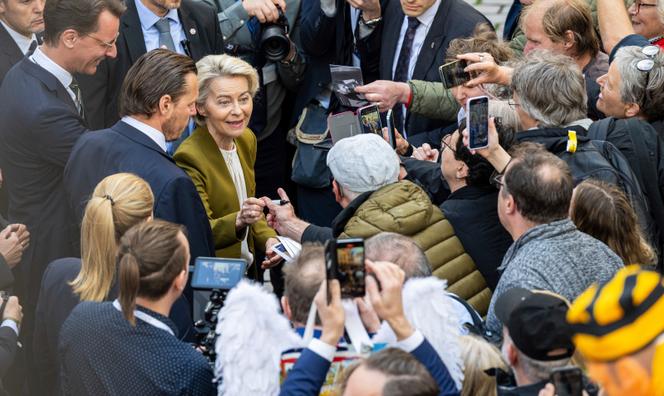
While party leaders in Rome, Paris, Berlin, Madrid and Warsaw have all been focused on the EU Parliament elections scheduled for June 6-9, Ursula von der Leyen is campaigning for something else: Her own re-election as the president of the European Commission. Less visible, the campaign is no less decisive.
Since the European People’s Party (EPP), which brings the European right-wing parties together, made von der Leyen, who was a minister under former German chancellor Angela Merkel, its candidate for the EU Commission’s presidency from 2025 to 2029, von der Leyen has been criss-crossing Europe, with an objective in mind that will require a tricky balancing act: To defend her party’s colors, without upsetting those who she will also need to win.
For her to be reappointed, the EPP must remain the leading political force in the European Parliament, which, if the polls for the upcoming election are to be believed, is assured. Yet that’s not all: Von der Leyen will then have to be nominated by a qualified majority of the leaders of European countries, and then approved by at least 361 of the 720 MEPs to have been chosen at the ballot box on June 9. The die has not yet been cast, and although she may have studied all the possible scenarios, she has not yet found the one that would ensure her victory. Far from it.
With the exception of Hungary’s Viktor Orban, who is opposed to her appointment, the mood among the European national leaders is rather favorable – at least as long as she tries to make the commitments that the members of her “electoral college” expect. The 27 EU member states, especially those who are not on her political side, are determined to sell their support for the highest price possible.
Constructive ambiguity
Von der Leyen has shown particular care toward German Chancellor Olaf Scholz and French President Emmanuel Macron, who seek to maximize their influence in Brussels by imposing their priorities or by securing certain high positions within the EU administration. Whenever she can satisfy their demands without angering either of them, she has done so. For example, she is currently ready to take on someone for her future staff who is close to the Elysée.
Yet there are some subjects which the campaigning president cannot tackle, given how much they are a source of division between Paris and Berlin. She has said nothing about Macron’s proposal to double the EU budget in order to finance the rise of the European defense industry at a time of war in Ukraine, nor on the green and digital transitions. Nor has she commented on how the EU should treat China, as Germany is pushing for a more trade-friendly agenda.
You have 62.35% of this article left to read. The rest is for subscribers only.